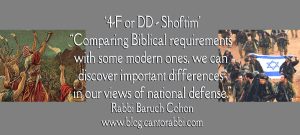4-F or DD? – Deut. 20 – Shoftim – by Rabbi Baruch Cohon
One section in this week’s Sedrah highlights a significant difference between Torah law and facts of life today, including in modern Israel. “When you go out to battle against your enemies,” it begins, you will get instructions. First the cohen, the chaplain, addresses the troops and urges them not to be afraid because the Almighty is on their side. “He will fight for you, to save you.” Then come the officers. They speak to the men they command, and offer certain exemptions, a total of four.
Number 1: A man who built a house that’s not yet dedicated, let him go home and dedicate his house, lest someone else take it.
2-one who planted a vineyard and still did not harvest it,
3-one who betrothed a wife and did not yet marry her, and
4-the last and most telling: one who is afraid of battle and could infect his fellow soldiers with his fear.
Clearly, Biblical Israel had a military draft, but conditions of service were different. Today’s State of Israel also has universal military service, and it also has legal exemptions. Different ones, to be sure.
- Israelis who moved to another country, for one.
- Those who have serious physical illness.
- Those who have serious mental illness – which presumably could include fear of fighting, but is not limited to that.
.
4-Also exempted are Yeshiva students who proclaim Torah to be their umanut – their profession. This rule may change now, since more religious Israelis are choosing military service, and the armed forces are beginning to provide opportunities for them to serve and still observe tradition.
When the United States had a draft, the main exemptions were more limited. In World War II for example, an incurable physical ailment got you a draft number 4-F – as distinct from 1-A, a good specimen. And if you did get drafted, or enlisted, and later showed psychological trouble, you got a DD – a Disability Discharge. Fear of fighting was not the determining factor for one of those.
Comparing Biblical requirements with some modern ones, we can discover important differences in our views of national defense. Neither here nor in modern Israel does the government care about the young man who just built a house, or just planted a field, or just got engaged to his sweetheart. We may wonder how long and how thoroughly those exemptions were observed. Considerations of the individual get discarded by powerful rulers. When we go to war, the nation comes first.
As dangers mount, we hear talk of renewing the draft in the United States. If that happens, we can well expect exemption problems based on politics, gender identity, and religious practice – particularly in a multi-cultural country like ours.
Can we look back on the Torah’s deferments and maybe seek a way to a lifestyle as innocent as that described in Sedrah Shoftim?
While we may make an effort to bring Torah into our daily lives, this is one time when that may look impossible. But what does not work today in military service can indeed affect our civilian attitudes. Let our neighbors dedicate their new house. Help them harvest their new vineyard. Give them a wedding present. Maybe we won’t keep a soldier out of action, but we could help a neighbor be a friend.
It’s not a law today. It’s just Torah-true action.



